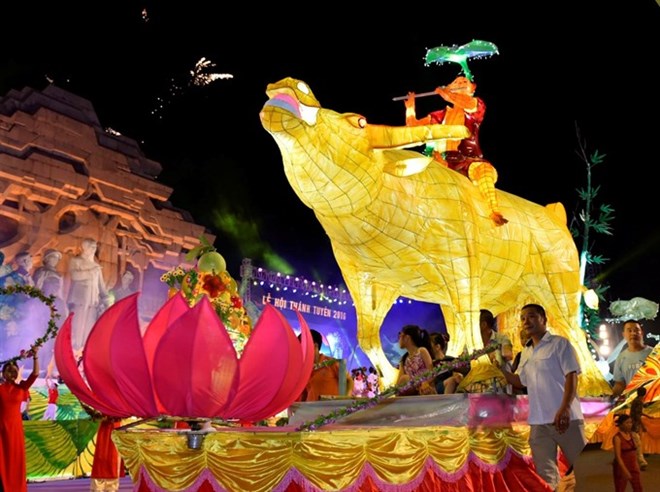
Some of the country’s intangible cultural heritages will go on show at a festival in the northern province of Tuyen Quang on September 20.

Local people make giant lanterns for a parade during the Thanh
Tuyen Festival (Photo courtesy of the organiser)
This is the first time the festival has been held in the province, giving
locals and tourists the chance to enjoy unique art performances.
The four-day event is expected to attract people from all over the country
featuring globally-recognised Thua Thien–Hue’s nha nhac (royal court
music), the gong culture of Tay Nguyen (Central Highlands), Bac
Ninh’s quan ho (love duet), ca tru (ceremonial singing)
and xoan singing (spring songs from Phu Tho province).
Also in Tuyen Quang province, the Thanh Tuyen Festival is taking place, which
is known as a festival of giant lanterns. It will feature a number of
international delegations and embassies.
The annual festival will take place from September 20-23 to honour and promote
local culture and art, according to Nguyen Hai Anh, Vice Chairman of the
provincial People’s Committee.
The opening ceremony will be held on September 21, with an art performance.
Other activities include historic and cultural exhibitions, food presentations,
sports and a conference about preserving and promoting intangible heritages
with tourism development.
The festival started in 2004 when some families modeled and decorated a few big
animal lanterns which were dragged along the street with a lion dance and song.
This was a big hit with children and adults alike and gradually evolved into
the festival it has become today.
Families would make modes of fish, rabbits and dragons.
The festival also became a cultural specialty of Tuyen Quang and was
recorded by Vietnamese Guinness Records as having the biggest lanterns in
Vietnam.
As the years passed, lanterns became more beautiful and more sophisticated with
many new styles but not forgetting the traditional roots. Thanks to this event,
Tuyen Quang attracts hundred thousand visitors.
"Beyond the meaning of a unique cultural festival, the Thanh Tuyen Festival is
a chance to introduce the tourism potential as Tuyen Quang houses many
beautiful destinations, cultural heritages and historical vestiges,” said Anh.
Source: VNA
With an increasingly vibrant and widespread emulation movement aimed at building cultured residential areas and cultured families, Yen Thuy District has been making steady progress toward improving both the material and spiritual well-being of its people, while fostering a civilized, prosperous, beautiful, and progressive community.
Once lacking recreational spaces and community facilities, Residential Group 2 in Quynh Lam Ward (Hoa Binh City) has recently received attention for the construction of a new, spacious, and fully equipped cultural house. The project followed the model of state support combined with public contributions in both labor and funding.
The "All people unite to build cultural life" movement, which has been effectively integrated with Kim Boi district’s socio-economic development goals, is fostering a lively spirit of emulation across local residential areas, hamlets, villages, public agencies, and enterprises. In addition, through the initiative, traditional cultural values are being preserved and promoted, while community solidarity and mutual support in poverty reduction and economic development are being strengthened.
A working delegation of the Hoa Binh provincial People’s Committee led by its Permanent Vice Chairman Nguyen Van Toan on June 11 inspected the progress of a project to build the Mo Muong Cultural Heritage Conservation Space linked to tourism services in Hop Phong commune, Cao Phong district.
Born and growing in the heroic land of Muong Dong, Dinh Thi Kieu Dung, a resident in Bo town of Kim Boi district, in her childhood was nurtured by the sweet lullabies of her grandmother and mother. These melodies deeply imprinted on her soul, becoming an inseparable part of her love for her ethnic group's culture. For over 20 years, this love for her hometown has driven Dung to research, collect, and pass down the cultural values of the Muong people to future generations.
In the final days of May, the Ethnic Art Troupe of Hoa Binh Province organized performances to serve the people in remote, mountainous, and particularly disadvantaged areas within the province. These were not just ordinary artistic shows, but they were the meaningful journeys aimed at spreading cultural values, enhancing the spiritual life of the people and contributing to the preservation of ethnic minority cultural identities.



